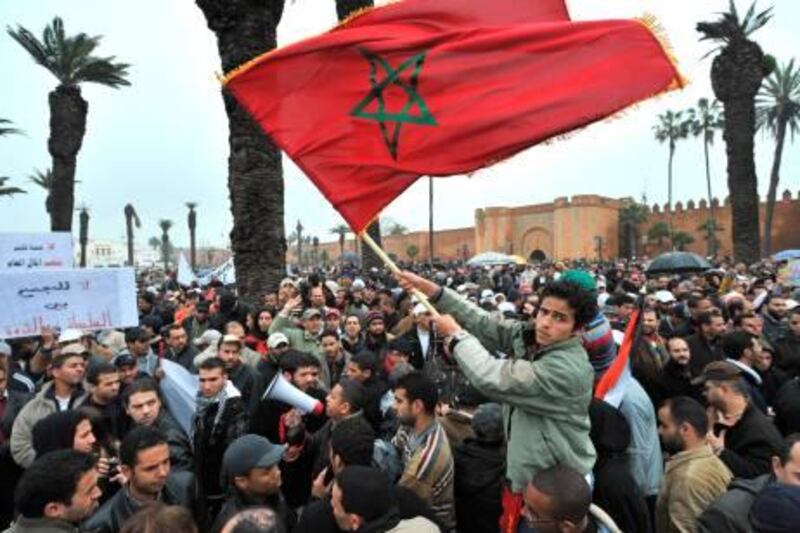RABAT // Protest rippling through Arab states reached Morocco yesterday, as thousands marched in cities around the country demanding reform to fight a host of social ills and reduce the power of King Mohammed VI.
A fine rain sifted down yesterday morning on Rabat, the capital, where the largest demonstration took place.
Like protests elsewhere in recent weeks, those in Morocco began with a campaign on Facebook inspired by revolts that toppled leaders in Tunisia and Egypt.
Moroccan protesters, however, have stopped short of calling for the departure of King Mohammed, whom it is illegal to criticise. But many link problems from corruption to unemployment on a lack of democratic reform.
Mohammed Kerkab, an economics professor at Cadi Ayyad University in Marrakech who joined the protest yesterday in Rabat, said: "In development projects, for example, the main problem is embezzlement. I want a constitution that separates powers, and an independent judiciary that will hold accountable those who steal."
Morocco has a parliament and active political parties. But the constitution makes King Mohammed both the highest religious authority and the head of state, with powers to dissolve parliament and name ministers and local governors.
Meanwhile, much of Morocco's wealth is concentrated in the hands of a small circle of powerful businessmen, royal confidantes and royally-owned companies, according to US diplomatic cables leaked last year by the online whistleblower Wikileaks.
Among the placards floating above the crowd of protesters yesterday in Rabat were two bearing the same slogan: "No to the union of authority and wealth".
Complaints about corruption are commonplace in Morocco. According to a report last December by the global corruption watchdog Transparency international, 34 per cent of Moroccans admitted to paying a bribe last year.
Since taking the throne in 1999, King Mohammed has earned praise for reforms including a new family code that expands women's rights and a truth commission to investigate abuses committed under his father, Hassan II.
Morocco has liberalised its economy since the late 1990s and enjoyed steady growth in recent years, helping attract foreign investment and win the country increased access to the European common market.
However, reform has slowed in recent years, while the government has failed to bring down high unemployment and illiteracy, and increasingly cracked down on media accused of breaking the law.
While a poll in 2009 gave King Mohammed a 91 per cent approval rate, authorities seized copies of the magazine that published it, arguing that the poll amounted to questioning the monarchy.
Aboubakr Jamai, a former magazine editor whose independent newsweekly, Le Journal Hebdomadaire, was closed by authorities last year, said: "I don't know if the regime is capable of responding to protesters' demands, given its taste for confrontational behaviour."
Authorities said that the magazine had failed to pay back taxes, which Mr Jamai blamed on a state-led advertising boycott and punitive fines.
"What we can say is that the regime can no longer deny that a part of Moroccan society wants a parliamentary monarchy, wants to change the system," said Mr Jamai, who attended yesterday's protest in Rabat.
Morocco's government has responded to the protests with a show of sanguinity. Police were all but absent from central Rabat yesterday, and officials have said in recent days that authorities would not seek to stop peaceful demonstrations.
The communication minister, Khalid Naciri, in remarks published last Tuesday by the state news agency, said: "No one can doubt the legality of the economic, social and political demands of these young people. We'll treat them with a spirit of openness."
By midday the crowd in Rabat had swelled to thousands and became a march. The protesters were young and old, men and women, wearing everything from jeans to jellebas.
As they turned into Mohammed V Avenue they swelled to 10,0000, hoisting aloft their banners with various demands. "Corruption, we say NO, resignation of politicians, we say YES" read one. "Enough with lies and un-implemented reforms" said another.
One banner, very large, said simply in English: "People want change".





